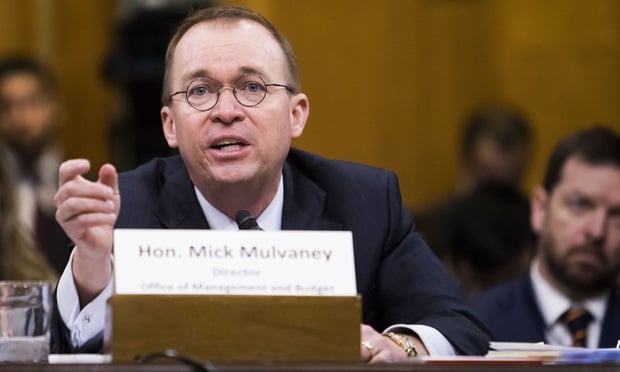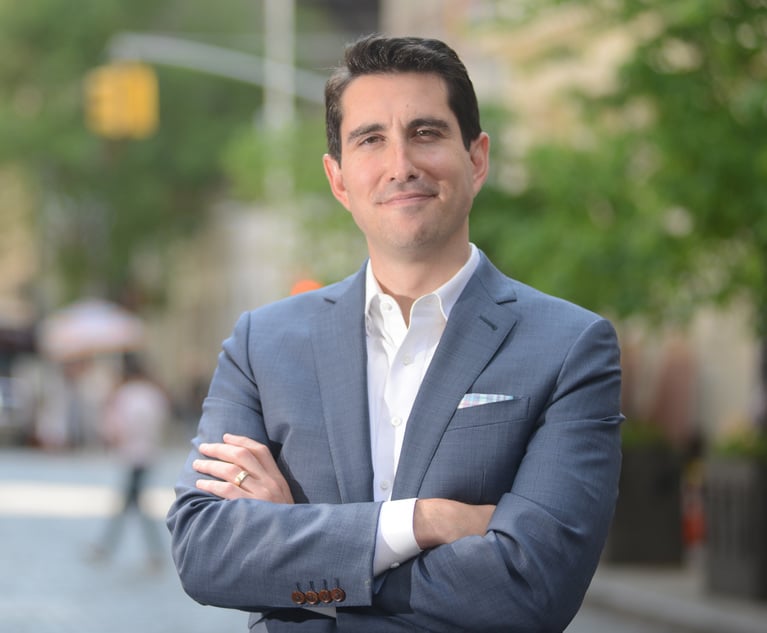Financial Industry Pushes for More Secrecy at Mulvaney's Consumer Bureau
Here's a snapshot of some of what the financial industry has told the Consumer Financial Protection Bureau about its civil investigative demands, long a target of criticism.
March 30, 2018 at 12:51 PM
6 minute read
 Mick Mulvaney testifies before the Senate Budget Committee in February 2018. Credit: Diego M. Radzinschi/ NLJ
Mick Mulvaney testifies before the Senate Budget Committee in February 2018. Credit: Diego M. Radzinschi/ NLJ In January, White House budget director Mick Mulvaney was just two months into his side job as the Consumer Financial Protection Bureau's interim director when he started soliciting feedback on the agency's work. His first area of inquiry: the CFPB's civil investigative demands.
Long bemoaned as overbroad and burdensome, the subpoenas apparently built up so much frustration that the financial industry players needed more time to prepare their critiques. Mulvaney earlier this month pushed the original March 27 comment deadline to April 26, granting the extension that two top lobbying groups—the Financial Services Roundtable and Consumer Bankers Association, represented by Buckley Sandler—had requested.
Others have chosen not to wait. Ahead of that initial deadline, lobbying groups and past targets of CFPB investigations have weighed in with calls for more tailored subpoenas and a change that would make companies more willing to push back against investigations: keeping records of challenges to civil investigative demands off the agency's website, away from the public eye.
Under the current scheme, defense lawyers have long griped that the public posting of such appeals forces their clients to essentially pick their poison: push back and confront the consequences of an early disclosure of the CFPB's investigation, or sit back and comply with a subpoena they see as flawed.
“You either agree to produce what is perceived to be unreasonable or unfair and agree to all of those terms. Or you don't agree to them and you risk the investigation becoming public and the reputational harm that comes with that. That seems extremely unfair,” Venable LLP partner Allyson Baker said in an interview Friday.
Here's what others have said in letters to the CFPB.
'Publicity has ruinous effects.'
In January 2017, after then-CFPB director Richard Cordray denied an appeal to a subpoena, one company, Future Income Payments, went to a federal court in Washington to prevent the agency from effectively publicizing the investigation by posting the records of that challenge online. Suing anonymously, as a “John Doe,” the company sought an injunction preventing the CFPB from disclosing the investigation.
U.S. District Judge Rudolph Contreras of the District of Columbia refused to grant the injunction, and a divided three-judge panel of the U.S. Court of Appeals for the D.C. Circuit refused to grant an “emergency injunction” pending an appeal. Future Income Payments, a company that provides consumers lump sums of cash in exchange for rights to their pensions or other future income streams, was revealed in March 2017 as the company facing a CFPB investigation.
A year later, Future Income Payments—represented by Womble Bond Dickinson partner Christopher Jones—wrote Mulvaney arguing that the agency's civil investigative demand process is “currently coercive and punitive.”
“The enforcement process is coercive because a CID recipient must choose between two paths: acquiesce to the CID regardless of the burden and its scope; or file a petition to modify or set the CID aside, in which case the bureau is likely to punish the recipient by publicizing the investigation,” Jones wrote. “That publicity has ruinous effects on the recipient: it causes third parties to sever their relationships with the recipient because they fear entanglement with the bureau, it scares away potential customers, and it leads class action lawyers and other potential plaintiffs to file lawsuits against the recipient.”
The 'compounded' harm of publicity.
Electronic Transactions Association, a payments industry trade group whose membership includes PayPal, Visa, Mastercard and American Express, argued that records related to subpoena challenges should only be made public after being scrubbed to conceal the identity of the targeted firm.
“The detrimental effect of a CFPB investigation is compounded when the fact of it becomes public. Accordingly, investigations are not made public until there is a consent order, a filing (if any) of a complaint or notice of charges, or until the subject of the investigation discloses the investigation as part of its reporting requirements,” Scott Talbott, the trade group's senior vice president of government affairs, wrote in a letter to the bureau. “However, under the bureau's current rules and practice, CID recipients cannot dispute the CID or its scope without making public the fact of the CID. This is unfair and harmful to CID recipients who are forced to choose between a confidential investigation and protecting their legal rights.”
Talbott continued: “The bureau's rules should be revised to ensure that if a party chooses to file a petition to modify or quash a CID in order to protect its rights, then the petition and disposition of that petition should only be made public after making redactions sufficient to ensure that the identity of the petitioner remains confidential.”
Nothing but 'punitive.'
Network Branded Prepaid Card Association, a trade group that represents Citi, Bank of America and Wells Fargo & Co., said its members believe that making subpoena challenges public “serves no other purpose than to act as a punitive measure toward a party asserting their rights under due process.”
“We therefore urge the CFPB to adopt a policy requiring that such motions be kept private,” wrote Brian Tate, the association's president and CEO.
FTC makes its case for public posting.
Without making an explicit recommendation, the Federal Trade Commission's bureau of consumer protection explained its reasoning for publicly posting records related to subpoena challenges. The FTC's consumer bureau said it has received complaints about disclosing subpoena appeals, “which reveals the existence of an otherwise non-public investigation,” the commission staff wrote.
So why, in spite of those complaints, does the FTC make subpoena appeal records public?
“The commission is acting in its adjudicatory role when it issues an order ruling on the petition” to limit or quash a subpoena, the consumer protection bureau staff wrote in its letter to the CFPB.
“Accordingly, the commission makes the petition and its ruling public (redacting confidential information protected by the FTC Act), consistent with the overriding interest in ensuring that the 'workings' of the government, including the adjudicative proceedings, are subject to the 'watchful eye' of the public,” the staff added, quoting from the Supreme Court's 1978 decision in Nixon v. Warner Communications, a case about access to judicial records.
Read more:
Three Things Companies Hate About the CFPB's Investigative Demands
The DC Circuit's Big CFPB Ruling Carries Wide Implications. Here's What's Next
Ex-Williams & Connolly Associate Snags Senior Adviser Post at Mulvaney's CFPB
Goodwin Procter Grabs Anthony Alexis, Formerly CFPB's Enforcement Chief
This content has been archived. It is available through our partners, LexisNexis® and Bloomberg Law.
To view this content, please continue to their sites.
Not a Lexis Subscriber?
Subscribe Now
Not a Bloomberg Law Subscriber?
Subscribe Now
NOT FOR REPRINT
© 2025 ALM Global, LLC, All Rights Reserved. Request academic re-use from www.copyright.com. All other uses, submit a request to [email protected]. For more information visit Asset & Logo Licensing.
You Might Like
View All
Wells Fargo and Bank of America Agree to Pay Combined $60 Million to Settle SEC Probe

Crypto Entrepreneur Claims Justice Department’s Software Crackdown Violates US Constitution
4 minute read
Kraken’s Chief Legal Officer Exits, Eyes Role in Trump Administration
3 minute read
SEC Ordered to Explain ‘How and When the Federal Securities Laws Apply to Digital Assets’
5 minute readTrending Stories
- 1Reviewing Judge Merchan's Unconditional Discharge
- 2With New Civil Jury Selection Rule, Litigants Should Carefully Weigh Waiver Risks
- 3Young Lawyers Become Old(er) Lawyers
- 4Caught In the In Between: A Legal Roadmap for the Sandwich Generation
- 5Top 10 Developments, Lessons, and Reminders of 2024
Who Got The Work
J. Brugh Lower of Gibbons has entered an appearance for industrial equipment supplier Devco Corporation in a pending trademark infringement lawsuit. The suit, accusing the defendant of selling knock-off Graco products, was filed Dec. 18 in New Jersey District Court by Rivkin Radler on behalf of Graco Inc. and Graco Minnesota. The case, assigned to U.S. District Judge Zahid N. Quraishi, is 3:24-cv-11294, Graco Inc. et al v. Devco Corporation.
Who Got The Work
Rebecca Maller-Stein and Kent A. Yalowitz of Arnold & Porter Kaye Scholer have entered their appearances for Hanaco Venture Capital and its executives, Lior Prosor and David Frankel, in a pending securities lawsuit. The action, filed on Dec. 24 in New York Southern District Court by Zell, Aron & Co. on behalf of Goldeneye Advisors, accuses the defendants of negligently and fraudulently managing the plaintiff's $1 million investment. The case, assigned to U.S. District Judge Vernon S. Broderick, is 1:24-cv-09918, Goldeneye Advisors, LLC v. Hanaco Venture Capital, Ltd. et al.
Who Got The Work
Attorneys from A&O Shearman has stepped in as defense counsel for Toronto-Dominion Bank and other defendants in a pending securities class action. The suit, filed Dec. 11 in New York Southern District Court by Bleichmar Fonti & Auld, accuses the defendants of concealing the bank's 'pervasive' deficiencies in regards to its compliance with the Bank Secrecy Act and the quality of its anti-money laundering controls. The case, assigned to U.S. District Judge Arun Subramanian, is 1:24-cv-09445, Gonzalez v. The Toronto-Dominion Bank et al.
Who Got The Work
Crown Castle International, a Pennsylvania company providing shared communications infrastructure, has turned to Luke D. Wolf of Gordon Rees Scully Mansukhani to fend off a pending breach-of-contract lawsuit. The court action, filed Nov. 25 in Michigan Eastern District Court by Hooper Hathaway PC on behalf of The Town Residences LLC, accuses Crown Castle of failing to transfer approximately $30,000 in utility payments from T-Mobile in breach of a roof-top lease and assignment agreement. The case, assigned to U.S. District Judge Susan K. Declercq, is 2:24-cv-13131, The Town Residences LLC v. T-Mobile US, Inc. et al.
Who Got The Work
Wilfred P. Coronato and Daniel M. Schwartz of McCarter & English have stepped in as defense counsel to Electrolux Home Products Inc. in a pending product liability lawsuit. The court action, filed Nov. 26 in New York Eastern District Court by Poulos Lopiccolo PC and Nagel Rice LLP on behalf of David Stern, alleges that the defendant's refrigerators’ drawers and shelving repeatedly break and fall apart within months after purchase. The case, assigned to U.S. District Judge Joan M. Azrack, is 2:24-cv-08204, Stern v. Electrolux Home Products, Inc.
Featured Firms
Law Offices of Gary Martin Hays & Associates, P.C.
(470) 294-1674
Law Offices of Mark E. Salomone
(857) 444-6468
Smith & Hassler
(713) 739-1250










